You may have gotten into law to help others, champion social justice, follow in a family member’s footsteps, or just to fill your days with fulfilling and intriguing work. What you might not have considered from the jump is how much time you’d spend on billable hour tracking and invoicing—when you’d rather be strategizing your next move, crafting compelling arguments, or connecting with clients.
If true, you’re in good (but frustrated) company. To get around these inefficiencies and focus on the work that matters, many firms use time tracking tools to streamline time capture. Our 2025 Legal Industry Report found that 67% of firms are now using attorney time tracking software, while 24% have invested in passive tools that automatically record billable time in the background.
Learn more about four firm-favorite attorney time tracking software solutions and how you can choose the best fit for your business.
What Is Time Tracking Software for Lawyers?
Time tracking software for lawyers helps legal professionals accurately track, record, and categorize the time they spend on client work to ensure they’re fairly compensated. This software typically works manually or passively.
Manual law firm time tracking software allows lawyers to actively start and stop timers when they begin a task or manually enter their time after the fact.
Passive law firm time tracking software automatically captures and documents time spent on various tasks without user input. According to the 2025 Legal Industry Report, more than half of passive time tracking software users report saving up to 15+ hours monthly with this technology.
If you're looking to optimize the time tracking process, consider some solutions that incorporate passive tracking in order to maximize billable hours.
1. LawPay
Best for: Time-tracking and payment collection with almost no learning curve
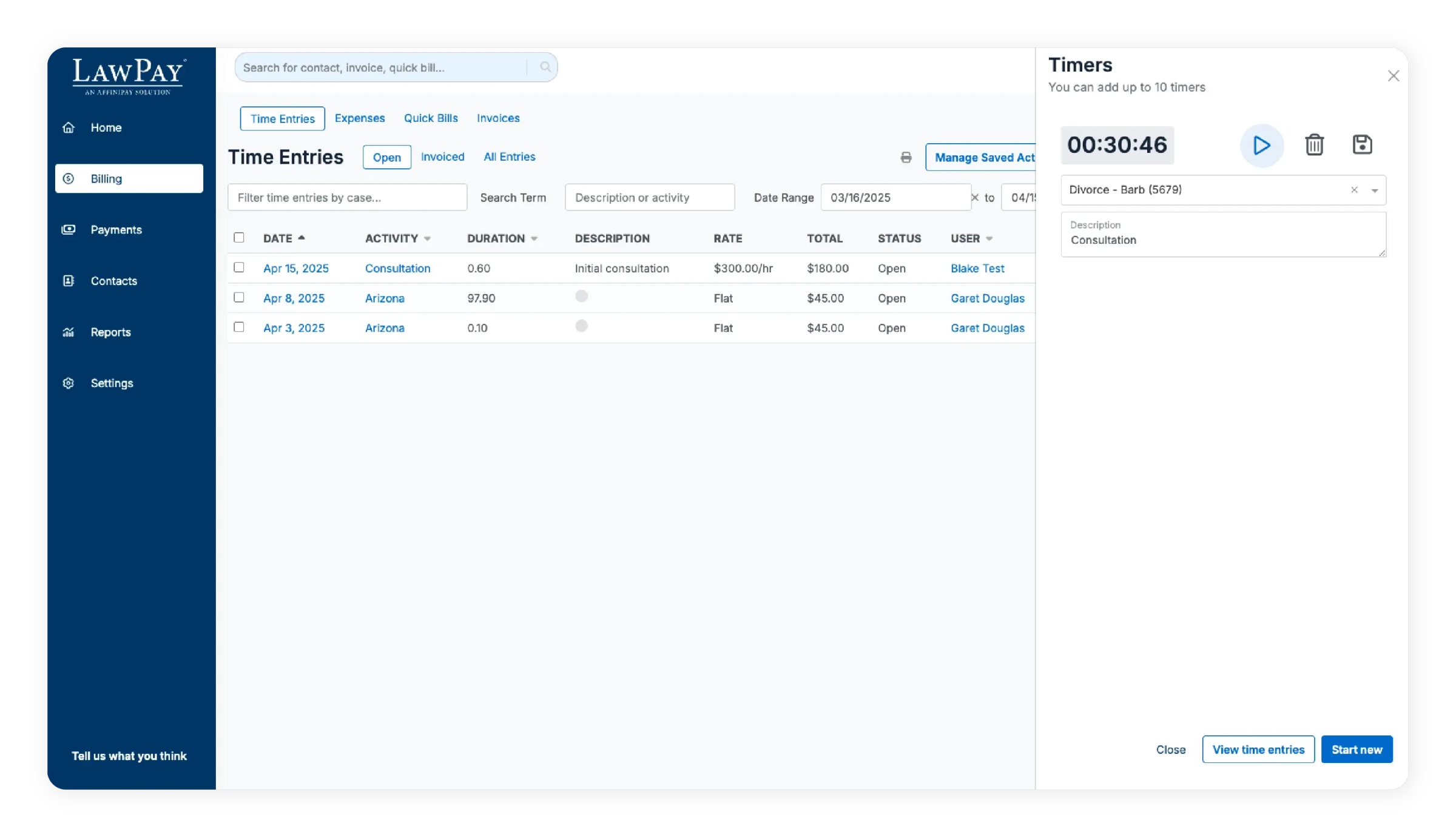
Built specifically for attorneys, LawPay significantly reduces the administrative burden of invoicing and boosts overall billing efficiency, making it a valuable time-tracking tool for legal professionals. Beyond simply processing payments, this intuitive attorney time tracking software helps you accurately track time spent on client matters, create and send invoices, and keep tabs on amounts paid and owed.
This software also integrates effortlessly with existing practice management tools, and most firms report getting the software up and running in 24 hours or less. Additionally, it comes with extra features to further streamline your firm's financial operations, such as flexible payment options to help you get paid faster and a spending dashboard to help you monitor costs that may be cutting into your profits.
Price:
Free demo available.
Paid version starts at $19 per month. It includes unlimited users, debit, credit, and eCheck payment options, billing and invoicing features, IOLTA and PCI compliance, software integrations, custom reporting for reconciliation, and unlimited phone support.
2. MyCase
Best for: Case management
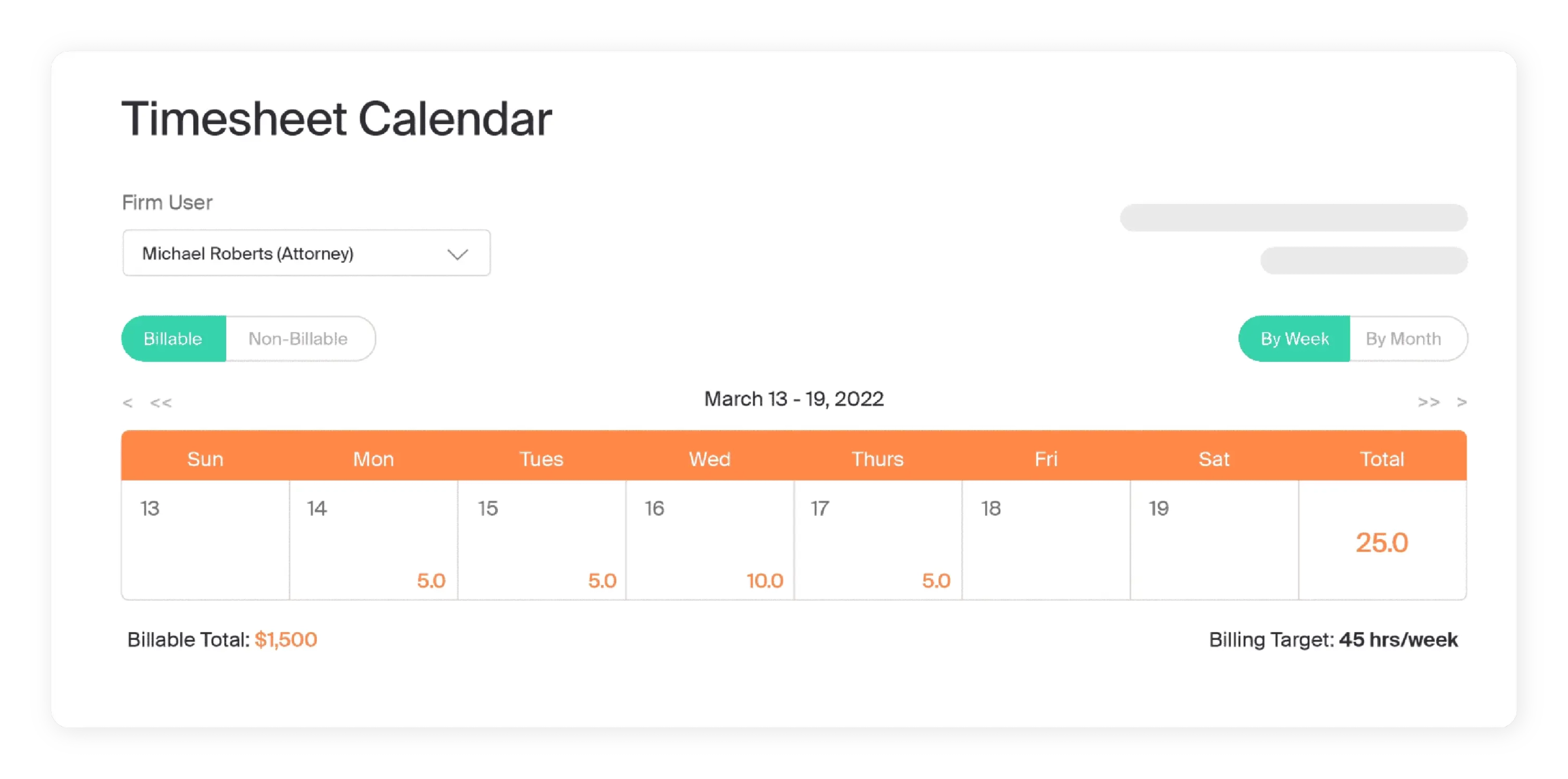
MyCase helps you track time spent on client work so you can avoid missing out on lost billable hours. To accomplish this, the software will prompt you to track your time so you can begin setting timers for any billable task. Additionally, MyCase’s Smart Time Finder (a passive time tracking tool) creates a list of billable activities at the end of the day to help you capture any task that may have fallen between the cracks.
MyCase offers various other features as well, including client intake forms, client portals, calendaring, document management, and built-in text messaging.
How it integrates with LawPay: There is no additional fee to integrate LawPay into your MyCase account. LawPay allows you to collect payments via debit, credit cards, eCheck, and payment plans.
Price:
Free demo and free trial available for 10 days.
Paid version starts at $39 per month and includes case and contact management, client portals, time and expense tracking, billing and online payments, legal calendaring, and unlimited document storage.
3. WiseTime
Best for: Full-service management for enterprise firms

WiseTime offers automated time tracking that captures your activity while you work. Based on your activity, the software can automatically detect case references, so it attributes time to the correct client.
You can also generate AI descriptions of your work—with its timezone detection feature always ensuring activities are properly tracked based on local time. These capabilities minimize the time your staff spends on manual data entry, allowing them to focus on substantive legal work.
Price:
A free trial is available for 30 days.
Paid version starts at $360 per user per year and includes cloud connections for small and medium-sized firms.
4. RescueTime
Best for: App blocking to improve efficiency
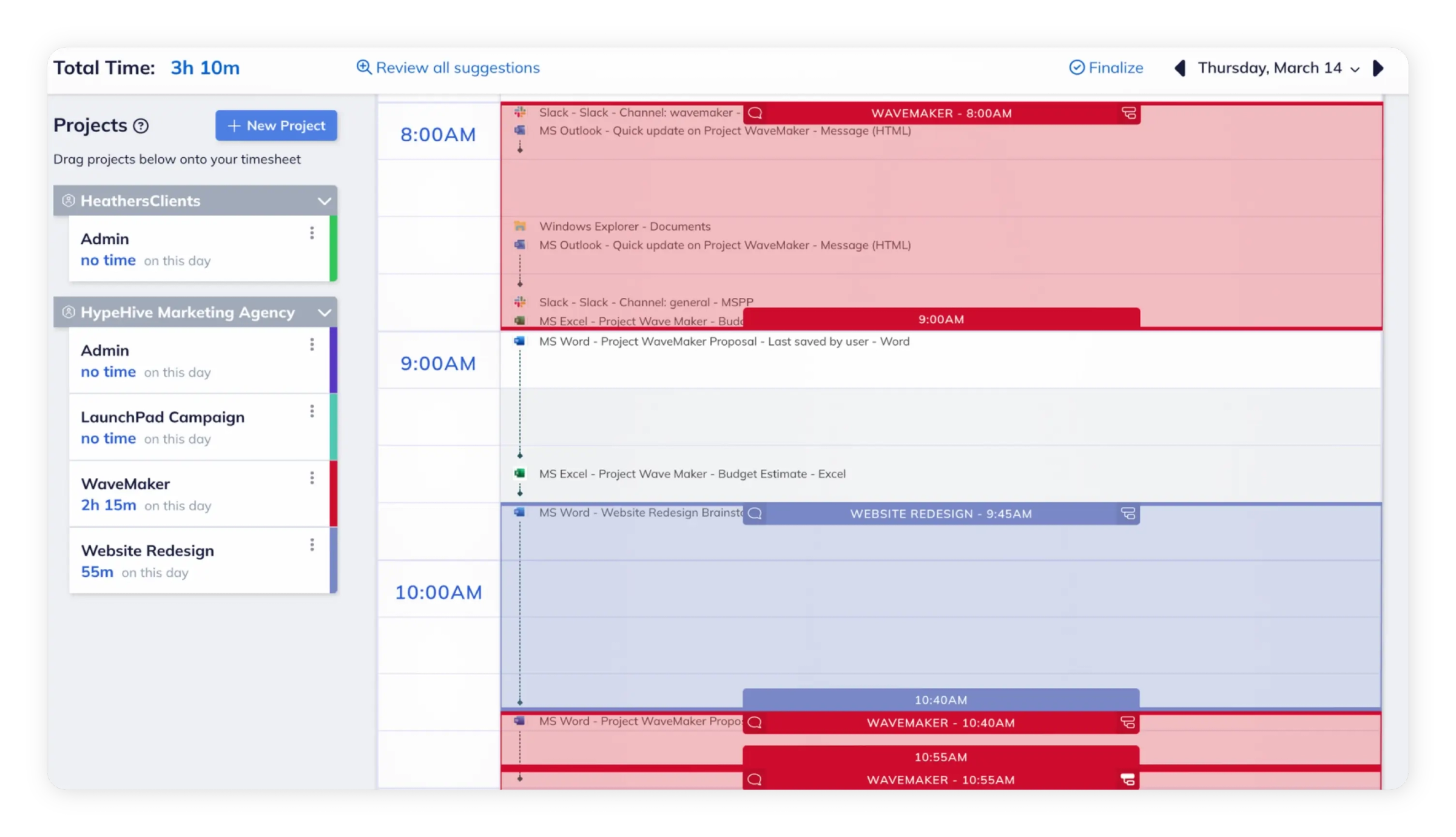
RescueTime offers automated time tracking, app blocking to maximize productivity, and detailed reports to reveal what you were working on and where your focus was. You can set custom goals, receive notifications, and easily generate time sheets with a simple drag-and-drop interface showing you a visual daily work timeline.
While RescueTime isn't specifically designed for lawyers, it still allows you to track billable hours across clients or projects.
Price:
A free trial is available for 14 days.
Paid version starts at $6.50 per month when billed annually and includes automatic time tracking for a single employee, as well as reports and insights.
What Features Are Essential for Attorney Time Tracking Software?
At a minimum, effective attorney time tracking software should measure the minutes spent on a task, enable manual adjustments, and offer expense and budget tracking capabilities. For more drastic workflow improvements, look for a tool that incorporates automations to help you cut back on manual labor.
Here’s a closer look at the features and capabilities you should look for as you start vetting legal tech providers offering law firm timekeeping software.
Minutes Capturing
Minutes capturing refers to the precise recording of time spent on client-related tasks. Manual law firm timekeeping software typically relies on lawyers starting and stopping timers. Passive lawyer time tracking apps can automate this process by monitoring activities, including tasks like document creation, client communication, and web browsing, to record minutes without user input.
More intelligent solutions can even differentiate between billable and non-billable hours by learning user behavior and associating specific applications, documents, or communication with particular client matters or internal tasks.
Time Adjustment
Whether you manually track your time or a lawyer time tracking app assists, it’s your responsibility to confirm those numbers are accurate before invoicing or e-billing the client. The best attorney time tracking software can make it easy for you to review and edit logged time entries for accuracy, and add or clarify descriptions.
Expense Tracking
Many legal time management software solutions will also have expense tracking capabilities that allow you to see costs associated with client matters at a glance. This feature can show you the total spent on expenses like filing fees, travel, expert witnesses, tests, photocopies, or networking.
Depending on your software solution, you can keep track of these expenses through manual entry, bank account integrations, or by analyzing receipts. Armed with this information, you’ll have all the documentation you need to bill the client for expenses related to their case or recoup business costs with tax write-offs.
Budget Tracking
Attorney time tracking software with budget tracking allows law firms to define spending goals. As time and expenses are logged and assigned to a client, the software monitors entries in real time against the set budget, alerting the firm if spending approaches or exceeds the predefined limits. This proactive approach helps control costs, manage client expectations, and keep projects financially viable.
Automation
Ideal attorney time tracking software can automate routine tasks like capturing billable time and generating invoices. These automations reduce the need for manual data entry, minimize the risk of forgotten billable time, and accelerate the billing cycle—ultimately improving efficiency and cash flow for the law firm.
Automation also means much less time spent on the process overall. And let’s face it—no one ever went to their grave wishing they spent more time entering numbers into billing software.
Key Performance Indicator (KPI) Reporting
Law firm key performance indicators (KPIs), such as the utilization rate and realization rate, gauge how individual lawyers and the firm are progressing toward their goals. If you already use a time tracking tool for other aspects of your business, leveraging its reporting features (if available) can provide valuable insights into productivity, efficiency, and overall financial health with minimal additional effort. This knowledge empowers you to make data-driven decisions that can improve profitability and client satisfaction.
What Should Different Firm Sizes Consider?
Time tracking software for attorneys will have different use cases depending on a firm's size. For example, smaller law firms may benefit more from budget-friendly, easy-to-implement time tracking software. Meanwhile, larger firms may require robust, scalable solutions with advanced features and integration capabilities to handle complex workflows and multiple users.
Below are some key points that different firms should consider when selecting software tools to help them track time.
Solo and Small Law Firms
Solo and small law firms often struggle with billing issues, such as clients not paying, inaccurate invoicing, and inexperience with billing.
Software that automates time tracking for lawyers can help them address these issues. For example, it can help by making it easier for clients to submit payments and by ensuring all invoices are detailed and correct.
Some key features to look for include:
Affordable monthly charges
A simple interface
Automation to save time
Mid-Sized Law Firms
Mid-size firms may needmany software tools for different aspects of practice and case management. Multiple lawyers will likely also need access to the time tracking software to ensure consistency with client billing and invoicing. Plus, managing partners need access to data to measure efficiency.
Key features to look for include:
Software that's affordable for multiple users
Full integration with existing systems
Customizable reports to track operational efficiency
Large Law Firms
Large law firms have unique needs for time tracking software, including affordable access for a large number of users, a solution that can track time for many different types of legal matters, effective expense tracking, and integration with existing systems.
Some key features to look for include:
Enterprise solutions customized to the firm's needs
Scalability as the firm expands operations
Detailed reporting to assess firm KPIs
How to Choose the Right Law Firm Time Tracking Software
Choosing the right law firm time tracking software depends on your industry and needs. To make the best decision for your practice, consider bottlenecks in your current timekeeping process, reporting needs and current shortcomings, security and compliance regulation requirements, and how much customer service assistance you anticipate needing.
Here are the steps to assess your needs and narrow down your options.
1. Review Your Current Process
Choosing the most relevant law firm timekeeping software begins by evaluating your current processes..
For instance, your firm can assess current time tracking procedures and diagnose its weaknesses. With this information, you can settle on time-tracking software for lawyers that best compensates for these issues.
2. Vet Reporting Capabilities
Reporting is a key feature of law firm time tracking software that can help you keep on top of accounts receivable, trust accounts, team productivity, and your firm’s financial health.
By making it possible to visualize metrics such as billable hours over time, it also gets easier to identify small issues before they become major problems. With legal time management software that also contains reporting features can help you quickly spot red flags and easily communicate solutions with your team members.
Reporting can also help you assess how new strategies work out over time.
For example, with LawPay’s financial reporting, you can:
Get a detailed list that shows you billable and non-billable time and expenses for each staff member.
View all trust account activity and balances to know when to request more funds.
Utilize financial reports with real-time data about your transactions, accounts receivable, aging invoices, and more.
3. Evaluate Security Features
Security breaches can potentially expose your firm to data or financial loss, reputational damage, or legal consequences. To be safe, select a tool that uses strong encryption to protect data in storage and during transmission. You can also set up two-factor authentication (2FA) to ensure only authorized personnel can access and modify time entries.
Some lawyer time tracking tools also offer more advanced security features like role-based permissions, consistent vulnerability scans, and comprehensive encryption. Assess your risk by evaluating the sensitivity of your client data and your firm's security protocols to determine if an upgrade is necessary.
4. Ask About Technical Support
No time tracking software, however well-designed, is without its quirks. Before committing to a provider, confirm that they have sufficient technical support and acceptable resolution times to avoid business interruption when setting up or using the software.
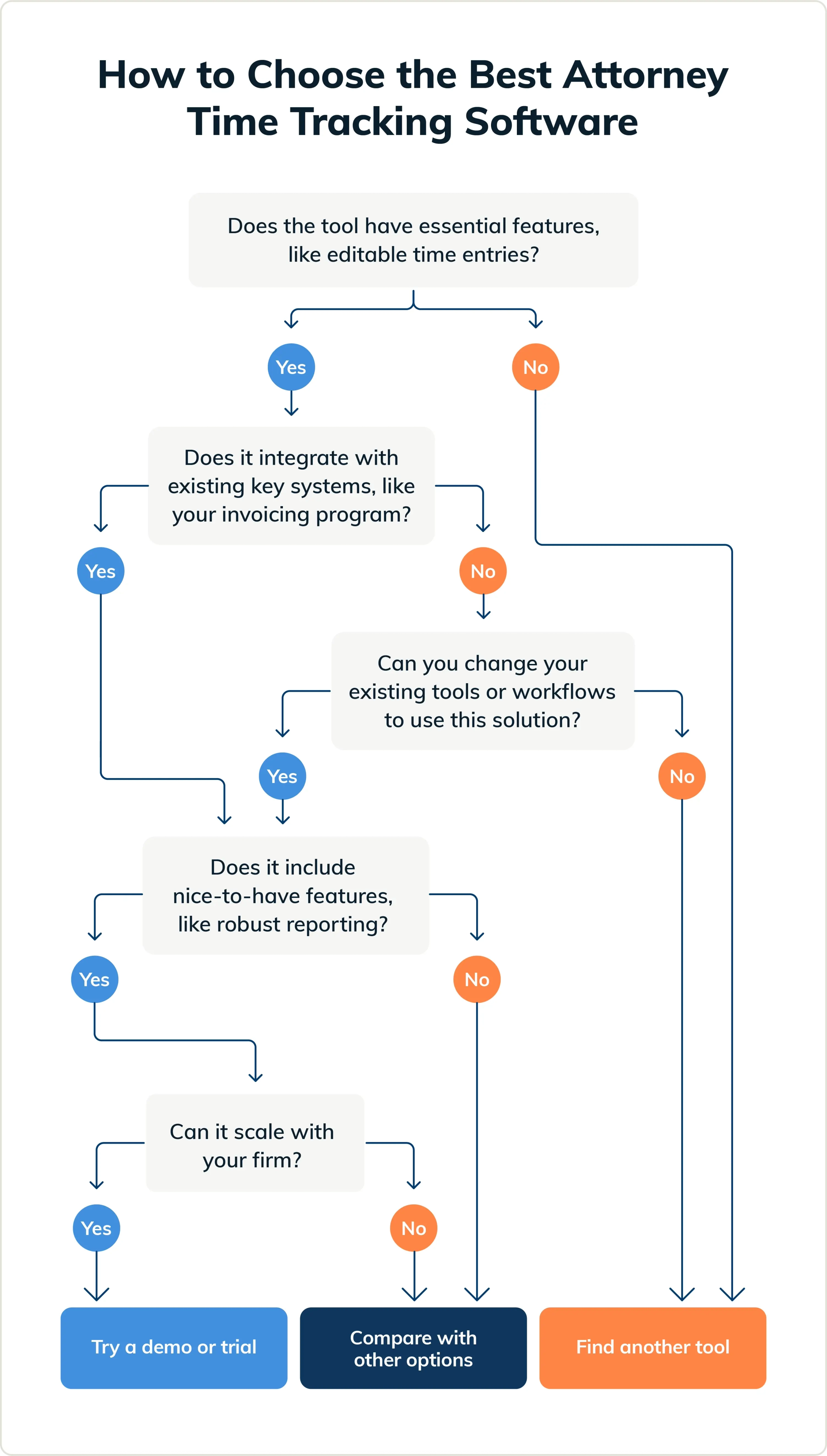
LawPay: The Best Time Tracking Software for Lawyers
LawPay offers the features that firms of all sizes need in time-tracking software. With full integration with existing case management tools, affordable monthly prices, and support available when you need it, you can more efficiently track your time on day one.
Schedule a demo today to learn more about how LawPay can help your firm make time tracking, billing, and invoicing simple.
Schedule a demo to see what LawPay can offer your firm.
Get a demo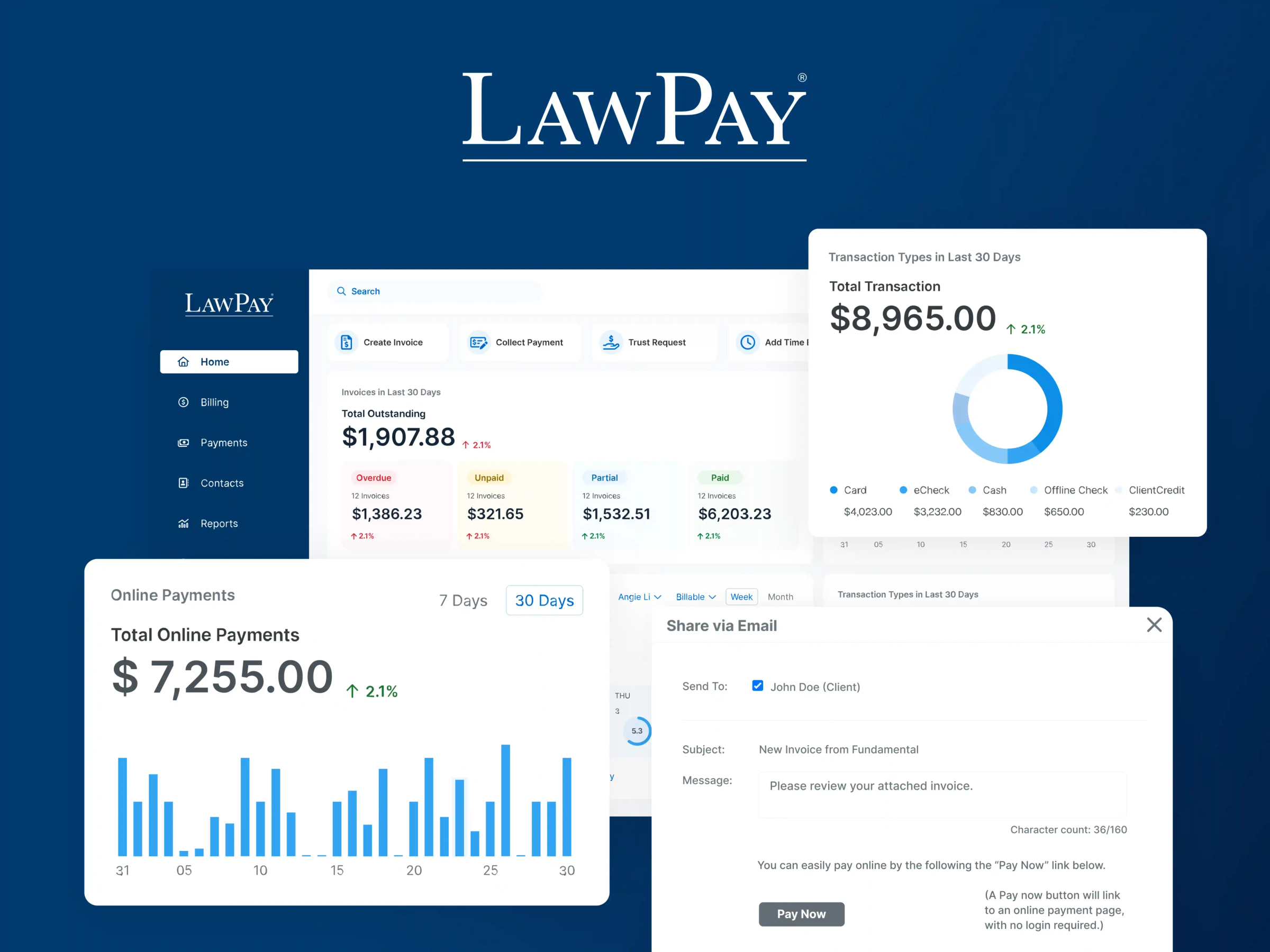
About the author

Trent Fowler
